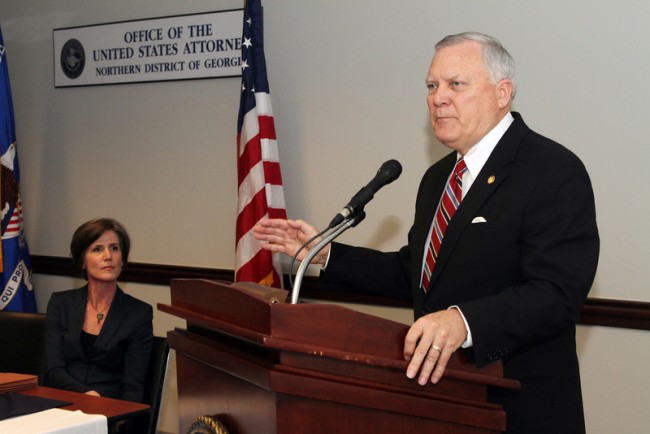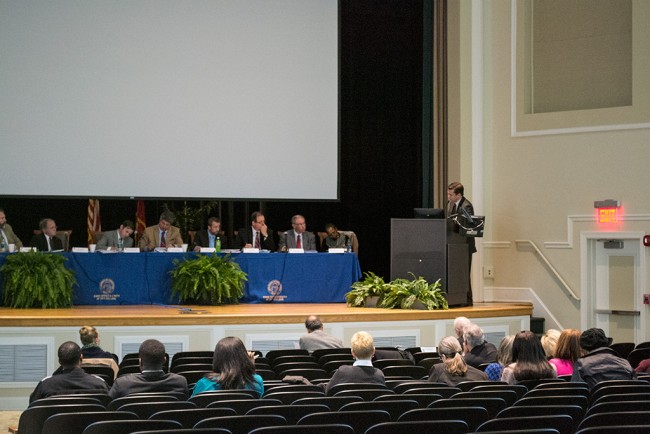by Georgia Center for Opportunity | Feb 7, 2014
Georgia Center for Opportunity (GCO) is pleased to see Governor Nathan Deal and U.S. Attorney Sally Yates (Northern District of Georgia) exercise their influence to encourage business leaders across the state to hire ex-offenders. They are urging employers to give ex-offenders a fair shot in the hiring process and outlining the benefits available to those who choose to hire them.

Governor Deal speaking at a Reentry Summit with U.S. Attorney Sally Yates on Feb. 5, 2014.
Image credit: Georgia.Gov, Office of the Governor.
These actions are consonant with recommendations made by GCO’s Prisoner Reentry Working Group this past December based on input from criminal justice practitioners in Georgia and a review of best practices across the country (See Increasing Employment Opportunities for Ex-Offenders).
One important recommendation made by the working group included increasing the chance that a person with a criminal record will get hired by postponing the question about an applicant’s criminal history to a point after the interview stage of the hiring process. Such an action would give the applicant an opportunity to demonstrate his or her qualifications for a job and provide an explanation for any criminal history to the employer during the interview. It also prevents an employer from automatically screening a candidate who may be the best fit for the position.
Another key recommendation made by the working group is that the state should set the example for other employers by hiring ex-offenders. This action would demonstrate that the state is serious about helping ex-offenders become employed and successfully transition back into society. We believe that the degree of success the state has in finding and maintaining qualified ex-offenders as employees will directly impact the willingness of private employers to adopt similar policies.
Read the following articles posted on February 6, 2014 in the Savannah Morning News to learn more about steps that the key state leaders are making to encourage businesses to hire ex-offenders: http://savannahnow.com/news/2014-02-06/ga-officials-urge-businesses-hire-ex-prisoners#.UvTmvLT-L1V.
by Georgia Center for Opportunity | Dec 11, 2013
This week, Georgia Center for Opportunity (GCO) published its first report on ways to improve reentry for ex-offenders in the state. The report focuses on increasing employment opportunities for ex-offenders and offers six recommendations for the State of Georgia to consider implementing. The report is a product of GCO’s Prisoner Reentry Working Group that has been working to develop solutions for curbing recidivism and improving offenders’ transition to communities throughout Georgia.
The first report focuses on employment because of the critical role it plays in an offenders’ success outside of prison.
Read the full report: Increasing Employment Opportunities for Ex-Offenders

-
- Image credit: U.S. Department of Labor, Bureau of Labor Statistics
by Georgia Center for Opportunity | Dec 3, 2013
The Governor’s Special Council on Criminal Justice Reform invited organizations from across the state to present recommendations for improving ex-offender outcomes at the Department of Corrections Headquarters in Forsyth, Georgia, Tuesday, November 26.
Eric Cochling, VP of Policy Advancement for Georgia Center for Opportunity, testified before the council with proposals generated from GCO’s Prisoner Reentry Working Group on ways to improve employment opportunities for Georgia’s ex-offenders.

-
- Georgia Center for Opportunity’s Eric Cochling testifying before the Governor’s Criminal Justice Reform Council.
He outlined the following five recommendations for the state to consider implementing:
- Lift driver’s license suspensions for drug offenders who have not committed a driving-related crime.
- Ensure offender’s identification is secured prior to release so they will be ready to apply for a job upon leaving prison.
- Incentivize employers to hire ex-offenders through offering tax credits or deductions, a bonding program, and protection from liability.
- Increase ex-offenders’ chances of being hired by postponing questions about criminal convictions until after an interview has been conducted, with the state setting the example by implementing this recommendation for public employment first.
- Lift professional licensing restrictions to allow ex-offenders to work in occupations that were previously off-limits to them because of a felony conviction that is unrelated to the professional license being sought.
Testifying before the Governor’s Council proved to be a critical first step in presenting GCO’s working group findings to state leaders, as the council consists of legislative, judicial, and executive appointees, as well as representatives from various sectors of criminal justice at the state and local level.
Established by the Governor in 2011 to protect public safety and hold offenders accountable while controlling state costs, the council has proposed significant reforms for adult sentencing and corrections and juvenile justice. Due to the success of the council’s recommendations and landmark legislation being passed during the 2012 and 2013 legislative sessions, Governor Deal commissioned the council to focus on improving prisoner reentry in the state next year, too.
For the upcoming 2014 legislative session, the council is working diligently to compile the best recommendations for the state to implement to reduce recidivism. However, due to the scope of this assignment, bills outlining the council’s recommendations may be introduced over the next couple of sessions.
Eric’s presentation received a positive response from council members leading them to ask several follow-up questions about other states that have enacted similar reforms. GCO is grateful for the opportunity to present and hopes that the council seriously considers our recommendations.
The recommendations for increasing employment opportunities for ex-offenders represent a sample of the reforms being proposed by GCO’s working group. Future recommendations will likely include ways to reduce debt and increase savings for prisoners, establish reentry courts, and implement specialized transitional centers across the state, among others.
by Georgia Center for Opportunity | Nov 5, 2013
Inmates of any faith are encouraged to apply to the first “Faith and Character-Based” prison in Georgia, at Walker State Prison, located in the northwest corner of the state. The Georgia Department of Corrections (GDC) is seeking to positively affect inmate behavior and reduce recidivism through this newly established program, which focuses on accountability, responsibility, integrity, and faith.

Inmates at Walker State Prison performing
An important part of GCO’s research within its Prisoner Reentry Initiative involves visiting correctional facilities throughout the state to view firsthand what programs and services GDC offers to prepare offenders to transition back into society. This varies greatly by the quality of education, training, and treatment they receive during their incarceration. Some facilities are better than others, and this prison impressed us as having great potential for success.
Changed Expectations: A Prison of Hope
Pulling up to Walker State Prison, it appeared that the prison was just like any other from the outside: razor-wire fence, guard tower, patrol car, lock-down facilities, and an overall feeling of intimidation. However, inside the prison, the atmosphere was quite different from what I expected. We were greeted by respectful inmates with head nods and hand-shakes, who appeared somewhat happy to see visitors. From observing a group of men in a classroom taking guitar lessons to seeing a large mural in the cafeteria depicting a scene from the Garden of Eden, an air of hope seemed to permeate the otherwise grim state facility.
What the GDC started in recent years with a dozen or so faith and character-based dorms throughout the state has evolved into this new two-year initiative being tested in Georgia. The success of these initial dorms paved the way for expanding the program into a prison-wide capacity at Walker in August 2011. This idea was first tested by Lawtey Correctional Institution in Starke, Florida, whose faith and character-based program has shown to positively affect inmate behavior and reduce recidivism since 2003.
Once inmates complete the two-year program, they will either transition into society (via parole, probation, or maxing-out) or transfer to another prison to finish their sentence. Participation in the faith-based component of the program is optional to inmates, but it can be readily accessed through taking various elective classes that are offered. Further, volunteers from the community come into the prison to mentor and help inmates grow in their respective faiths.
Culture of Reform = Unlocked Lockers
At the core of the program is the idea that inmates should be men of character. This is not a policy that is forced from the top-down; rather, it is a goal that each inmate internalizes personally.The pilot group of men adopted articles that govern the way they interact with each other and painted them on the cafeteria wall to be on display for all to see. They even decided to keep all of the lockers in their living quarters unlocked as a reminder to be men of integrity. This powerful symbol – exemplified in the unlocked locker – shows the extent to which the inmates strive to create a culture of reform that is distinct from other prisons.
The staff and inmates at Walker State Prison are cultivating something that is indeed unique among Georgia prisons, as well as in the country at large.
The chaplain shared with us that sometimes men come into his office crying because they feel a sense of release from the oppression that marks the prisons from where they came.
It often takes time for inmates who recently transfer into Walker to adjust to the new prison culture. However, once this starts to happen, the shell around their heart begins to crack, and for the first time in years an inmate may be seen with a smile on his face, finding a ray of hope during this dark time in his life.
Educational Focus
During our visit, I had the opportunity to attend one of the elective classes offered at the prison, taught by volunteer Bruce King. He provides valuable assessments to measure inmates’ vocational competencies and gifts, where they discover the type of jobs for which they are a good fit. They also learn how to reframe their story in a positive light and explain to employers why they are the best candidates for a particular job. This seminar gives inmates priceless tools to overcome formidable barriers to employment (such as getting hired with a criminal record), as well as the confidence to know what they are naturally good at doing.
Much more than seminars are offered. In fact, the entire prison has an educational focus. The inmates spend their day taking both general education and elective classes. The general education classes have proven to be very successful in enabling inmates to acquire a GED certification. Elective classes are more faith-focused, allowing inmates to choose classes based on their respective faiths. Currently Christianity, Judaism, Islam, Buddhism, Jehovah’s Witness, and Wiccan faiths are represented.
The electives are facilitated entirely by inmates and volunteers, as the state does not provide funding or staff to run the faith and character-based program. Two electives at the prison, Greek and Hebrew classes, are taught by seminary-trained inmates from Phillips State Prison (this prison offers courses from New Orleans Baptist Theological Seminary). This model of inmate-facilitation provides a great opportunity for inmates to assume leadership roles, to grow in confidence, to hone their professional skills, and to positively impact their fellow inmates.
Beautiful Trash and Second Chances
The counselor at the prison introduced us to several inmates throughout our tour, and one of these men supervised the art program. We had the privilege of seeing pictures of some of the masterpieces this group produced. The majority of their paintings depicted scenes from the Bible, such as Jesus praying in the Garden of Gethsemane and Daniel in the lion’s den. They paint the murals on bed sheets and donate them to churches, foster homes, vacation Bible schools, etc. The group also uses recycled cardboard to build creative works of art, including a toy castle, motorcycle, model plane, and a life-sized grandfather clock with coke insignia all over it (this piece looked so good that it’s now sitting in the Coca-Cola Museum).
The supervisor of this group of artists told us that the message they want to convey through their artwork is that God takes what the world deems as trash and turns it into something beautiful.
It is this same message of redemption that they hope to communicate with their lives.
On a larger scale, at Walker inmates are beginning to see what is possible as they develop a new way of thinking and believing, recovering what has been marred from years of destructive thought patterns. They are seeing their worth as human beings who have been given unique gifts and abilities, and recognizing fresh opportunities where they can serve other people.
For offenders who desire a second chance at life, Walker State Prison is a good place to begin this journey.
by Georgia Center for Opportunity | Sep 12, 2013
Recently, the Georgia Center for Opportunity (GCO) conducted its second working group meeting on the issue of prisoner reentry. Working group members traveled from across the metro-Atlanta area to convene with like-minded professionals who desire to see prisoners succeed in reentering society. The members come from a variety of professional backgrounds, including criminal justice agencies, various non-profits, addiction recovery, research, and reentry consulting (not to mention one member is a former prisoner himself).

Employment is the first area of focus that we chose to address as a working group. This was a logical place to start because of the critical role employment plays in the successful reintegration of offenders. For starters, having a job enables ex-offenders to meet their basic needs for food, housing, clothing, and transportation. Secondly, it affords them the means to meet various obligations that they may have, including paying child support, court fees, damages, and restitution. Last but not least, work provides offenders with an important sense of purpose, accomplishment, and worth which are essential for human thriving. For all of these reasons, having a job and maintaining it is one of the strongest antidotes for recidivism.
However, getting a job is not that easy for a person coming out of a prison. One of the main reasons for this is due to the fact that he carries an unattractive criminal record.
Each time an ex-offender seeks a job, he must face the dreaded question “Have you ever been convicted of a felony?”
It is precisely his response to this question that will most likely disqualify him from the job that he seeks. It is not likely that he will get a chance to explain his arrest or conviction to the employer before he is screened from the pool of applicants. All the ex-offender wants is the opportunity to demonstrate that he is the right man for the job, but the box on the application keeps him from showing the employer the extent to which he is qualified.
It would be easy to condemn employers for not hiring more ex-offenders, but we also must consider their point of view. Employers desire to hire the best possible candidates for positions that they are trying to fill, and they may reasonably feel that a college graduate better suits a given position than a 30-year-old ex-offender with no prior work experience. Employers want workers who have demonstrated success, who have proven their reliability, who will represent their company well, who are effective at managing their time, and who can appropriately handle stressful situations. They want problem-solvers, and they have little patience for problem-creators. If they have reason to believe that an ex-offender may create issues in the workplace because of her history, it is understandable why they would show reserve in hiring her.
However, without considering an ex-offender’s qualifications, the obstacles she has overcome, and the potential that she offers, an employer is cutting both himself and the ex-offender short.
In automatically screening those with a criminal history from the pool of applicants and labeling them as a liability to the company, an employer could be passing up his best employee. Many offenders are itching to prove themselves to employers, to their families, and to the community, and they will go to great lengths to do just that. They want to demonstrate that their lives have been turned around; they want to show that they can provide for the needs of their families; they want a shot at redemption.
In discussing this reality, the working group agreed that employers should take three things into consideration in order to ensure a fair hiring process. These include the nature of the crime committed and its relation to the position sought, the amount of time that has elapsed since the crime, and the qualifications of the ex-offender in reference to the job. By taking these criteria into account, the employer can assess the risk that the ex-offender may pose to her company, while also evaluating the value that he would bring.
Finally, the group discussed the benefits that could occur by an employer postponing the question about criminal history until after the interview is conducted. This policy would be good for several reasons: It would allow the ex-offender to put his best foot forward during the job interview; it would enable the employer to critically evaluate the applicant’s qualifications independent of his record; and finally, it would give the ex-offender a chance to explain his felony conviction in person. This process would promote fairer hiring practices and would greatly enhance an ex-offender’s opportunity of getting a job.
And in a world of seemingly insurmountable odds, ex-offenders need all the opportunity that they can get.
Related links:
• Roberta Meyers, Ray P. McClain, and Lewis Maltby, “Best Practice Standards: The Proper Use of Criminal Records in Hiring,” The Legal Action Center, the Lawyers’ Committee for Civil Rights Under Law, and National Workrights Institute, 2013, http://www.lac.org/doc_library/lac/publications/Best_Practices_Standards_-_The_Proper_Use_of_Criminal_Records_in_Hiring.pdf.
• Paul Samuels and Debbie Mukamal, “After Prison: Roadblocks to Reentry. A Report on State Legal Barriers Facing People with Criminal Records,” A Report by the Legal Action Center, 2004, http://www.lac.org/roadblocks-to-reentry/upload/lacreport/LAC_PrintReport.pdf.
• Margaret Colgate Love, “Relief from the Collateral Consequences of a Criminal Conviction: A State-by-State Resource Guide,” Prepared with support from an Open Society Institute fellowship, October 2005, http://blogs.law.columbia.edu/4cs/files/2008/11/statebystaterelieffromcccc.pdf.
• “How to Cut Prison Costs” New York Times, November 10, 2012, http://www.nytimes.com/2012/11/11/opinion/sunday/how-to-cut-prison-costs.html.
by Eric Cochling | Sep 5, 2013

When I tell people that part of my work involves heading up a project on prisoner reentry reform, I’m often met by puzzled looks. Given my organization’s other work – including fighting for education reform and school choice, encouraging stronger families, and combating human trafficking, etc. – many understandably wonder where prisoner reentry fits.
On the surface the answer is not necessarily obvious but, once I explain what motivates our work, the connection normally becomes clearer.
Over the last decade, part of our work involved efforts to strengthen families in the inner city through helping community leaders improve family life by offering workshops on relationship skills, conflict resolution, financial management, and similar topics to people in the community. The thinking – supported by the evidence and common sense – is that if you can improve relationships among family and community members, you can help improve many of the social problems people face. When you do this kind of work in the inner city, you quickly find that you can’t strengthen families there very successfully without also addressing the impact of incarceration, which too many inner-city families experience – especially in Georgia.
In 2009, the Pew Center on the States released a study showing that Georgia led the country with 1 in 13 adults under some form of correctional supervision. Nationally, the number is 1 in 31. The Georgia number includes some 56,000 prisoners and 160,000 probationers. Annually an average of 20,000 prisoners are released and, as our experience in inner-city Atlanta confirmed, most are not prepared to be successful outside the prison walls. Of those released nationally, nearly 65 percent will be re-arrested in three years and, in Georgia, about 30 percent will find themselves back in prison within that time.
That is why we launched our prisoner reentry working group in July after many months of research, dozens of interviews, and visits to four state prison facilities. Our nine working group members consist of individuals with considerable expertise in Georgia’s correctional system and a strong interest in improving outcomes for prisoners returning to the community. The working group will meet monthly over the next year to develop policy and service related recommendations on ways our state can improve prisoner reentry to reduce recidivism while improving positive outcomes for prisoners (like job attainment and retention, housing stability, and staying sober and drug-free, among others).
During our first meeting, the group quickly decided upon several broad areas of focus for their work over the next year. Those areas include
- Employment: Looking at ways to remove barriers to and increase opportunities for prisoners to obtain and retain employment upon release
- Reentry Courts: Exploring how the state might create courts that specialize in working with prisoners as they are reentering the community
- Transitional Centers: Finding ways to increase the capacity of Georgia’s transitional centers to serve more people and looking at whether centers specialized to work with specific kinds of offenders could be more effective in reducing recidivism
While each of these topics is large, the working group is committed to zeroing in on very specific, common sense ways to improve each area that offer the greatest potential for measurable improvement.
In the coming weeks, we will be posting updates on the working group’s progress. Needless to say, we are encouraged by the work the group has done so far and by the level of commitment each person has shown in improving outcomes for reentering prisoners.
Page 8 of 8« First«...45678






